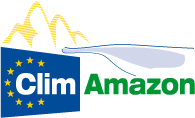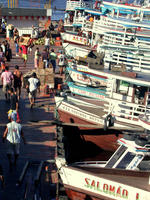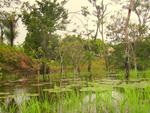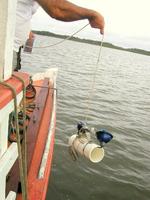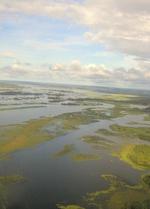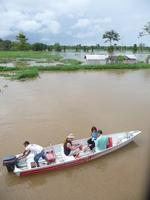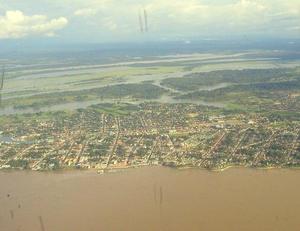Project beneficiaries
Institut de recherche pour le développement
France
Fundação Universidade de Brasília
Brazil
Stichting Koninklijk Nederlands Instituut Voor Zeeonderzoek
The Netherlands
Jacobs University Bremen Ggmbh
Germany
Imperial College London
United Kingdom
Helmholtz-Zentrum Potsdam, Deutsches GeoForschungsZentrum
Germany
Universiteit van Amsterdam
The Netherlands
Università degli Studi di Napoli Federico II
Italy
IRD-UnB co-operation
The CLIM-AMAZON project was built on the basis of the current French-Brazilian joint laboratory LMI-OCE (Laboratoire Mixte International-Observatoire des Changements Environnementaux), that harness synergies from the complementarity of the observational, analytical and modeling platforms of IRD (Institut de recherche pour le développement) and UnB (Universidade de Brasília).
First steps: The ORE-HYBAM
The scientific and technical co-operation on hydrology and hydrochemistry of continental waters is one of the oldest and most productive axes of the France-Brazil scientific co-operation. It began in the nineties with the project “Management of Water Resources in Brazil”. Since then, IRD has invested in the Amazon basin on a long-term basis in collaboration with South American universities and agencies, notably through the ORE-HYBAM (Observatoire de Recherches en Environnement sur l’Hydrologie du Bassin AMazonien). This program on the hydrology and the geochemistry of the Amazon basin (1997-2000) was extended for 4 more years (2001-2004) with the opening to a scientific partner in the Amazon region: UEA (Universidade do Estado do Amazônas) of Manaus.
In 2003, ORE-HYBAM was validated by the French Ministry of Research. The selected analytical platforms were those of IG-UnB (Instituto de Geociências, Brasilia) and GET-IRD (Géosciences Environnement Toulouse) . In 2006, the observatory was approved by the GEMS/Water Programme (United Nations Environment Programme, UNEP) for the Amazon basin.
CNPq-IRD projects
After more than 10 years of mutually fruitful collaboration between the Institute of Geosciences at the University of Brasilia (IG-UnB) and the LMTG/GET-IRD laboratory at the University of Toulouse, in 2005 a new project was approved between IRD and CNPq (Conselho Nacional de Desenvolvimento Científico eTecnológico) on the biogeochemistry of floodplain lakes (várzeas ) in the Amazon region (2005-2009) (project involving as well other Brazilian universities, as Universidade Federal Fluminense UFF at Niteroi and Universidade Federal do Amazônas UFAM at Manaus).
LMI-OCE: origin and objective
In 2009, IRD and UnB/IG jointly decided to create the LMI-OCE “Observatory of Environmental Changes” which is hosted at the IG-UnB for the 2009-2013 period. The LMI-OCE was built with an increasing participation of Brazilian institutions and new funding agencies partnerships, including CNPq and CAPES (Coordenação de Aperfeiçoamento de Pessoal de Nível Superior ). It is considered as a joint Science and Technology Centre, which is not a separate entity from its funding partners. Relying on a strong strategic research mission, it supports a panel of research and training activities.
LMI-OCE is committed to understanding contemporary environmental changes, particularly through interactions between ecological dynamics (aquatic and terrestrial) and processes of anthropogenic origins. Reconciling field campaigns, laboratory analysis and integrated modeling, activities of the LMI OCE are mainly focused on the following issues:
- Studying the transfer of water, sediment and chemical elements in order to evaluate the impact of climate and anthropogenic forcing in the Amazon;
- Modeling the interaction between the floodplain and the main river courses;
-
Surveying and analyzing processes of greenhouse gas emissions and carbon storage in various hydro-systems (which are poorly constrained in the tropics).
From now on, new themes also emerge, through an expanded partnership that bodes innovative scientific development for the coming years, namely:
- Reconstructing the geodynamic Amazon using the geochemical tracing;
- Analyzing and modeling the sustainability of ecosystems and biodiversity in relation to aquatic hydrology and climate change;
- Modeling the impact of public policies in terms of land cover / land use and biodiversity;
- Observing and analyzing environment - health interactions.
The analytical platform is currently shared between two sites: UnB in Brazil and IRD-GET in France. It includes a vast range of field monitoring and laboratory analytical instrumentation allowing a full physico-chemical characterization of waters, sediments and rocks. Field studies are also supported by the satellite remote sensing that allows the measurement of water surface properties giving access to physical parameters through inverse modeling.
Scientific output and dissemination
From 1997 to 2010, these various research projects and laboratories involving IRD, IG-UnB and other South American partners have led to the publication of 132 papers in international journals (65% being co-publications), and the achievement of 17 doctoral theses (including 4 joint supervision), 49 Masters and 33 courses at different levels. IRD, UnB and other South American partners organize every two years a scientific conference based on the results of ORE-HYBAM. Furthermore, IRD, UnB co-organize annual summer schools on earth observation from space and more thematic schools, such as ‘Stable isotope geochemistry’ conducted at UnB in 2010.
Connection with CLIM-AMAZON
Within the INCO-LAB call, the CLIM-AMAZON project sets up a EU-wide framework for the opening of LMI-OCE to new participating researchers from FP7 MS/AC (EU Member States and FP7 Associated Countries), including PhD students, Post Docs and senior scientists. This strategy will enhance the research capacity of a Brazilian-French team focused in the climate and biogeochemical studies of the Amazon River basin, and initiate research on the geodynamic and climate, erosion and sedimentation variability of this large river basin, on the European level.
CLIM-AMAZON in the XV Brazilian Congress of Geochemistry - Brasilia 2015- 2015 Annual Meeting/ 4th Workshop and Clim-Amazon results presentation in the 6th Ore-Hybam Conference - Cusco 2015
For the CLIM-AMAZON project fencing, the 4th CLIM-AMAZON Workshop and the International Symposium on Climate and Geodynamics of Amazon Basin (2015 CLIM-AMAZON Annual Meeting) will take place in Brasilia on the 21st and 22nd of October 2015, respectively, during the XV Brazilian Geochemistry Congress (19th-22th October 2015).
The CLIM-AMAZON results will be presented also in Cusco during the 6th Ore-Hybam Conference (26th-30th October 2015).
For more information about the XV Brazilian Geochemistry Congress, click here:
http://www.sbgq.org.br/15cbgq/
For more information about the 6th Ore-Hybam conference, click here
6th HYBAM Scientific Meeting - Cusco 2015 (1.29 Mo)

